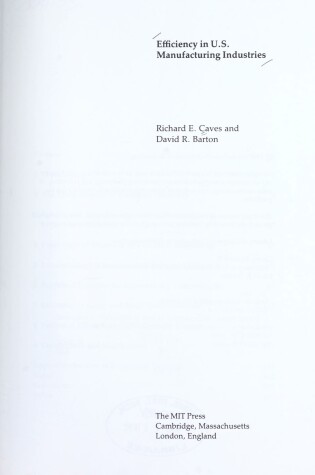Using the recently developed stochastic frontier production function, Richard Caves and David Barton estimate the degree of technical efficiency in nearly 350 U.S. manufacturing industries and explain the variation in efficiency among industries. They reach a number of strong conclusions, including the observation that import competition and flexible employment arrangements are beneficial whereas corporate diversification hurts efficiency.Caves and Barton describe and evaluate the stochastic frontier production function, which allows them to credibly estimate technical inefficiency. Using U.S. Census data on individual manufacturing establishments, they obtain the frontier production functions for over 300 industries. They then propose hypotheses derived from modern developments in economic analysis and theory which explain differences in efficiency. The hypotheses embrace many dimensions of competition and economic organization (both enterprise and labor), as well as sources of heterogeneous productivity levels such as capital-vintage differences, product differentiation, and differential rents to innovationAmong studies of efficiency that have been conducted over the past three decades, "Efficiency in U.S. Manufacturing Industries" is unmatched in the breadth and depth of its coverage. The hypotheses tested range more widely, and the analysis is extended to cover differences in efficiency among small and large firms and in the dynamic effects of efficiency differences on industries' rates of productivity growth. The review of the existing literature is unusually complete.Richard Caves is Professor of Economics and Business Administration at Harvard University. David R. Barton is an economist with the International Trade Administration, U.S. Department of Commerce.
- ISBN10 0262031574
- ISBN13 9780262031578
- Publish Date 14 March 1990
- Publish Status Out of Print
- Out of Print 28 February 2001
- Publish Country US
- Publisher MIT Press Ltd
- Imprint MIT Press
- Format Hardcover
- Pages 204
- Language English
